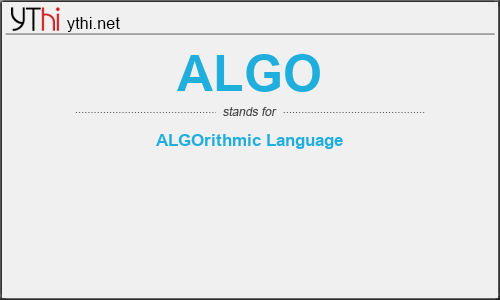What does ALGO mean? What is the full form of ALGO?
The full form of ALGO is ALGOrithmic Language
ALGOL (/ˈælɡɒl, –ɡɔːl/; short for “Algorithmic Language“) is a family of imperative computer programming languages originally developed in 1958. ALGOL heavily influenced many other languages and was the standard method for algorithm description used by the Association for Computing Machinery (ACM) in textbooks and academic sources for more than thirty years.
In the sense that the syntax of most modern languages is “Algol-like”, it was arguably the most influential of the four high-level programming languages among which it was roughly contemporary: FORTRAN, Lisp, and COBOL. It was designed to avoid some of the perceived problems with FORTRAN and eventually gave rise to many other programming languages, including PL/I, Simula, BCPL, B, Pascal, and C.
computer programming language, any of various languages for expressing a set of detailed instructions for a digital computer. Such instructions can be executed directly when they are in the computer manufacturer-specific numerical form known as machine language, after a simple substitution process when expressed in a corresponding assembly language, or after translation from some “higher-level” language. Although there are many computer languages, relatively few are widely used.
Machine and assembly languages are “low-level,” requiring a programmer to manage explicitly all of a computer’s idiosyncratic features of data storage and operation. In contrast, high-level languages shield a programmer from worrying about such considerations and provide a notation that is more easily written and read by programmers.
ALGO
means
ALGOrithmic Language![]()
Translate ALGOrithmic Language to other language.


Leave a Reply
You must be logged in to post a comment.